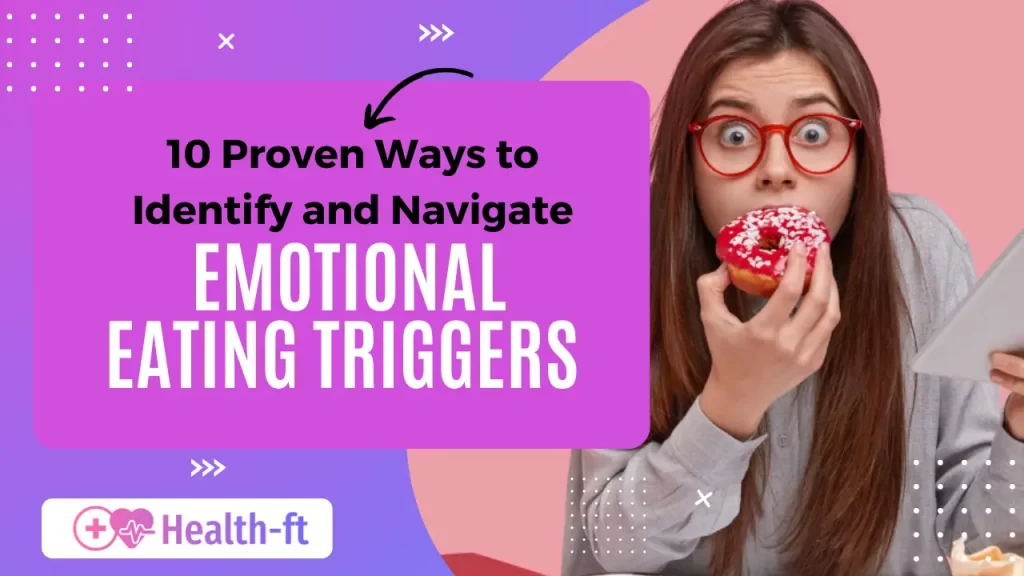One must understand that emotional eating disorder is something that people go through quite often. It’s the process of looking for food to help in dealing with stress when one is stressed or dealing with complicated feelings. Therefore, emotional eating may at first seem quite innocent. Still, in the long run, it leads to uncontrolled eating habits, excessive weight gain, and many other detrimental effects on a person’s mental and physical well-being. 69% of overeating is said to be caused by emotions rather than hunger, according to research recently carried out. Identifying and comprehending the emotional eating signals is the initial step for stopping the cycle and to gain control of emotional eating.
In this article, you will discover the symptoms of stress eating and how to stop eating emotionally using different tools. Knowing your food’s emotional link helps to establish new healthy coping mechanisms and balanced eating. So, let’s take an in-depth look at the root cause, how you can spot the signs that you are an emotional eater, and finally, how you can reclaim your freedom and get out of this cycle once and for all.
What is Emotional Eating?
Emotional eating is the act of eating to cope with stress, anger, anxiety, boredom, melancholy, and loneliness. It is quite distinct from the familiar physical hunger, a basic physiological need, which is the body telling one it is time to eat. Comfort food, therefore, refers to snacks that contain a lot of sugar or fat and, when taken, give temporary satisfaction.
This is one of the fundamental distinctions that must be made when discussing hunger. For this reason, emotional hunger ambushes and feels intense, unlike physical hunger, which progresses slowly. A person experiencing emotional hunger will crave something in particular, maybe chocolate or fast food, and the hunger does not disappear, however complete he may feel. This is the critical understanding that those struggling with controlling food intake should comprehend to prevent the act from turning into ‘emotional eating’.
Understanding Emotional Eating Triggers
Trips are emotions or situations that cause one to turn to food for comfort. Such stimuli may originate within an individual, such as stress or boredom, or without, such as social events or the presence of desirable food. The stimuli that provoke emotional eating also significantly differ, but the common one is an attempt to deal with negative feelings about food.
Why does this happen?
Whenever we feel stressed or experience negative emotions, our body releases cortisol, which stimulates hunger and cravings for high-calorie and high-density foods such as carbohydrates, sugars, salts, and fats. The momentary increase in those ‘feel-good’ hormones, such as dopamine, gives temporary relief. However, this relief is temporary, and a person who turns to emotional eating experiences feelings of guilt and regret and a more intense need to continue the cycle.
Research has it that stress-induced eating habits have caused several people to gain a lot of weight with the consequent health complications that come with it. Moreover, the American Psychological Association has managed to establish a poll according to which 38% of adults eat unhealthy products or overeat because of stress at least once a week.
The Role of Stress in Emotional Eating
Stress is a priority because it leads to emotional eating. Stress causes our bodies to go into adrenaline rush or fight-or-flight mode, raising cortisol levels. This hormone increases appetite and desire for foods high in sugars, fats, and salt. Consequently, these foods provide relief or pleasure, though they stimulate the release of dopamine, a neurotransmitter in the brain.
However, this creates a stress-eat-cycle and momentary satisfaction, becoming a vicious cycle in due order. The challenge is that after stress is depersonalized, you come out feeling worse than you did before—guilty over what you ate, physically uncomfortable from overeating, and even more stressed. This may result in elevated cases of being and food binging, which may lead to weight gain and more emotional stress.
Identifying the Causes and Triggers of Emotional Eating
To maintain consistency in the course, you should consider the following steps to determine the causes and symptoms of emotional eating. Stress can be in any form that brings about negativity, and this includes emotional eating triggers. Here are some of the most common ones. These are a few of the most typical ones:
Stress
One of the previously mentioned causes of emotional eating is stress. Stress comes in many forms – be it work-related or other issues such as relations and finances, and among them, it contributes to the desire to take a bite of comfort food. To beat stress effectively, it’s essential to identify how emotions influence hunger and how people tend to eat snacks or meals even if they are not hungry.
Boredom
Another example of an emotional eating trigger is when a person feels bored and eats out of boredom. Idle time is one of the triggers for overeating because people are bound to concentrate on consuming food when they have no other meaningful activities. This is especially true when food is abundant at home or other social places with snacks.
Loneliness or Sadness
Emotional hunger also leads to such events, as people use food to comfort themselves when they feel lonely or sad. As the above discussion shows, this type of emotional eating is usually related to a need for comfort or emotional satisfaction. To fill these voids, humans run to the comfort of food to feel infinitely companioned or happy.
Fatigue
That means if one is physically or mentally tired, he cannot decide what to eat. Eating foods that can cause you to have fuzzy thoughts when feeling drained arises from looking for an energy surge. The high-carb, high-sugar foods immediately boost energy but are often succeeded by feelings of even more exhaustion.
Social Influences
Other circumstances, such as events like parties or gatherings, can also cause emotional eating habits. When there are other people, especially at parties or special occasions, it becomes challenging to avoid eating since that completes the whole event. This eating mainly arises from group eating and is characterized by overeating or making unfavourable food choices.
Habitual Eating
Some practice eating as an automatic response to some stimulus. For example, if you always take snacks each time you watch TV, this is an emotional trigger. Even though you might not want to eat because your tummy is filled, food becomes something you do to take a break or, in other words, to lay back.
Strategies to Identify and Overcome Emotional Eating Habits
Being aware of such behaviour is essential to stop emotional eating. Emotional eating is automatic, meaning you cannot quit doing it if you don’t recognize it. Here’s how to navigate and manage emotional eating effective patterns:
Using Journaling to Identify Emotional Eating Patterns
Journaling is a powerful tool that complements emotional eating therapy, helping individuals recognize emotional links to food. Record all the foods and beverages you consumed and your emotions when you ate them. Such an approach will assist you in identifying any relationship between your mood and the food you consume. For instance, let’s suppose you have realized that the cases where you require junk food are the ones where you are stressed; stress is an emotional signal.
Physical Hunger and Emotional Hunger
It is essential to learn one’s type of hunger, physical or otherwise. Appetite is a physiological need; it is more prolonged, can be easily quenched with any product, and does not cause remorse. Emotional hunger is immediate and food-selective and results in compulsive eating and shame and guilt feelings.
Mindfulness Check-In
Observe mindful eating, which entails heaving and taking a break before getting to the food. Learn to distinguish between actual hunger pangs and false ones, which stress, anxiety symptoms, or boredom might cause. Monitoring one’s emotions is a way of telling if one is eating because of hunger or emotions.
Pay Attention to Cravings
Hunger, often associated with comfort food,s is usually emotional eating. For instance, if you need ice cream or pizza, you must look into the possibility of stress or loneliness, among others, being behind the food craving.
Identify Your Triggers
It is good to think about what leads to the development of the emotional eating habit. Could it be stress that is work-related? Loneliness? Fatigue? However, those are the triggers you need to work on so that you don’t have to use food to deal with the emotion that was triggered in the first place.
Use a Delay Tactic
These urges should be avoided, but you should try to delay your response when the feeling comes. Remove the trigger and set the alarm for 10 minutes before it gives you the craving. At that time, you should start something that will divert your attention from the problem or issue, such as going for a walk or reading a book. This delay will allow you to determine if the craving results from hunger pangs or emotional factors.
Create a Trigger Toolkit
A “trigger toolkit” is an idea that is based on developing other ways of dealing with emotions that make you turn to food. Such options may be breathing, performing yoga exercises, writing down your thoughts in a diary, or dialling a friend. When you have several healthy responses on the list, they help to change the act of emotional eating with something more helpful.
Reprogram Your Brain
Form new perceptions about foods and beverages. Instead of eating cake or fries, reward yourself with a new book, hobby, or time to relax. This can also help you wean off or reprogram in a way that allows you to change other habits, such as seeking emotional comfort in eating.
Practice Portion Control
If you use food to comfort yourself, consider the portions. Instead of eating from a bag or container, eat a small portion without distractions. This will ensure you do not overeat when emotionally charged, and eating healthy will be easy.
Developing a Healthier Approach to Handling Stress
It is also possible to reduce emotional eating by learning new healthy stress management methods. Here are some practical alternatives to turning to food: Here are some practical alternatives to turning to food:
Exercise Regularly
Despite the studies on the subject, exercise is a beneficial strategy for stress management. It causes the body to produce more endorphins, a hormone that improves mood, and less cortisol. Thus, exercise is an effective technique for managing stress without turning to food.
Improve Sleep Hygiene
Lack of sleep is a perfect reason to give in to emotional eating. You will likely eat unhealthy foods if you are too tired to gain energy. Ensure you get the required 7-9 hours of quality sleep on any given night to enhance your mood and moderate cravings.
Practice Relaxation Techniques
Deep breathing, meditation, or even yoga can help ease the pressure that can lead to binge eating.
It is worth comparing two concepts: Emotional Eating and Mindful Eating.
Another advantage of mindful eating is that it can significantly combat emotional eating. With mindfulness, you can learn to focus on the present moment without passing judgment on your feelings, ideas, or bodily experiences.
Slow Down
Eat small portions of food in moderation. Pace reduction makes you aware of your body’s hunger and fullness signals, which can prevent overeating.
Remove Distractions
When it comes to eating a meal, do not have any distractions around you, such as the television or your phone. This practice not only prevents mindless eating, where one gets carried away by emotions and does not know when they are full, but it also contributes to building a healthy lifestyle focused on mindful eating habits.
Ways of Developing Support that Can Help to Overcome the Problem of Emotional Eating
Appealing to your emotions doesn’t mean you are alone with the problem of emotional eating. One important feature is that a woman’s strong support system can make all the difference in breaking this cycle.
Seek Professional Guidance
Food is linked to mood, and counselling from a therapist, dietician, or counsellor can help you have the necessary tools to tackle the triggers that make you turn to food for comfort. More specifically, Cognitive Behavioral Therapy (CBT) is a way of helping people to change their behaviours and emotions concerning eating by identifying negative cognitions.
Recount the Support from Friends and Family
Share your plans to pay attention to emotional eating with friends and relatives. They can give you moral support and motivation and help you find motivation when feeling low.
Final Tips and Conclusion
It is expected to experience emotional eating, but you can manage your eating by identifying such indicators, constantly self-checking, and being conscious of your nibbling. The most important thing is to expect even such a thing and not be too critical of yourself during this period.
Practice Self-Compassion. If you are a stress eater, do not feel like a failure if it happens. It happens and should be recognized; one should strive to improve next time.
Focus on Progress, Not Perfection: No channel prevents people from eating emotionally in a few days. Don’t underestimate and guard against small failures and incremental progress.
FAQs
how to prevent emotional eating?
Prevent emotional eating by identifying triggers, practising mindfulness, and adopting healthy coping mechanisms like exercise or meditation.




